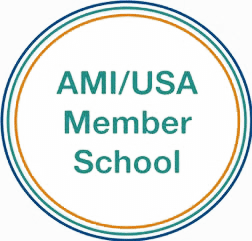Choosing a school can be daunting. Schools adopt philosophies and methods from different sources, and it can be challenging to tell the difference between various approaches.
While Montessori and traditional schools both seek to help students learn, each type of school has a different way of meeting that goal. Learn to recognize how Montessori programs differ from traditional learning environments so you can make the best choice for your child.
Understanding Children as Individuals
Traditional primary education focuses on ensuring that all children are taught the same content in the same way and at the same pace. Using tools like Common Core, many states have adopted standards that determine what children should know and be able to do by the end of each grade. Students are then given standardized tests to assess their knowledge. If they do well, they are deemed academically successful.
A Montessori primary program treats every child as an individual. Montessori classrooms are multi-age — this method recognizes that each child learns at their own pace. Curriculums are adaptable and allow for more than just one learning pathway for all students.
Fostering a Sense of Independence
In a traditional primary school environment, the focus remains on the teacher as the ultimate source of knowledge and understanding. Children come to school each day and learn to trust their teacher to tell them what they need to know to be successful.
In the Montessori primary environment, teachers facilitate learning by preparing the classroom, but the students take the lead. Students are empowered to choose what they want to learn and work on during long periods of open-ended activity. Instead of being the sole source of knowledge, teachers serve as guides, documenting progress and providing support when requested.
Learning to Embrace Mistakes
Traditional school environments often expect perfection from students. They reward children when they behave according to a set of rules and punish them when their behavior doesn’t align with those standards. Students quickly learn that mistakes are embarrassing and bring unwanted attention and consequences.
In a Montessori primary program, mistakes are viewed as valuable learning opportunities. Instead of being punished, Montessori students are encouraged to embrace mistakes, reflect on what went wrong, and find ways to correct them.
Through natural consequences, Montessori students learn that their actions have an impact on themselves and those around them. This approach fosters a sense of responsibility.
Using Hands-On Materials and Experiential Learning
Traditional school environments are filled with textbooks and pencils. Children often learn by writing down information the teacher gives them. Students sit mainly indoors, with very little time for movement.
In the Montessori environment, primary-aged children are encouraged to move around the classroom. They are often given time for outdoor learning experiences as well. Montessori materials are hands-on and invite curiosity. Experiential learning with real-world tools takes center stage, ensuring children are prepared for life outside of the classroom.
Educating the Whole Child
A traditional classroom focuses only on academic success. When traditional schools do incorporate social and emotional learning, it often comes as a separate lesson, similar to a core subject like math or science. Traditional schools also limit social interaction, so children rarely learn to live in a community with each other.
The Montessori method fosters social and emotional learning by allowing students to spend lots of time with others. Social and emotional skills are built and emphasized through communal activities and modeling respect for others.
Montessori Programs Build a Lifelong Love of Learning
It’s a big task to figure out what type of school environment your child will thrive in. Understanding the differences between them can help you evaluate your goals and make the right selection. At Montessori West, our primary program is focused on developing a child’s academic interests and character, believing that children flourish with gentle guidance and self-discovery. Contact us today to see how we can help your child build the skills they need for a lifetime of learning and success.
